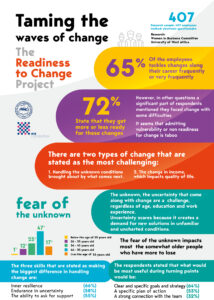 Darwin’s ideas about adaptability being key to survival are more relevant today than ever before in human history, as all facets of life—from our families and the way we live and work to the world we live in—are changing at an unprecedented pace. The way we learn, apply ourselves, work, and progress is undergoing major transformations that are shifting the success, achievement, and work paradigms as we know them. Technological advances, climate change, and unprecedented globalization are shaking the foundations of the world in which we have learned to be successful and effective.
Darwin’s ideas about adaptability being key to survival are more relevant today than ever before in human history, as all facets of life—from our families and the way we live and work to the world we live in—are changing at an unprecedented pace. The way we learn, apply ourselves, work, and progress is undergoing major transformations that are shifting the success, achievement, and work paradigms as we know them. Technological advances, climate change, and unprecedented globalization are shaking the foundations of the world in which we have learned to be successful and effective.
With this in mind, the Women in Business Committee of the American-Hellenic Chamber of Commerce commissioned a survey (n=407) among business executives in Greece on the readiness to change. The survey’s findings show that 65% of respondents have faced turning points often in their careers, irrespective of age or years of employment.
Our ability to accommodate radical change will depend on our ability to build bridges of support, knowledge and action
What changes do people find challenging?
Change is part and parcel of the work experience at any stage of one’s career. This means that we all need to build and grow our change muscles, preparing ourselves and developing the skills required to turn turning points into successful transitions.
According to the survey, 7 out of 10 respondents feel prepared for the changes happening in their work environment; just 6.4% stated that they are rather not ready for the oncoming changes. In actuality, what these figures express is respondents’ willingness to accept and go through changes at work. The majority, then, feel ready to endure change—but does that mean that they are also ready and prepared to successfully cope with it?
The survey clearly identified seven types of change that respondents found tough to handle, namely:
Changes that are hard to handle
- decline in expected income
- uncertainty about future strategy
Changes that are fairly hard to handle
- supervisor changes
- moving into a different position within the company
- new working conditions
- changes in goals and in strategy to fulfill the targets
- changes in people and teams

What is it about change at work that is toughest to handle?
No, it is not stress and anxiety about change that is the toughest to handle. According to the survey, the toughest thing to handle about change at work is uncertainty and the looming unknown (23.7%), as well as the lack of information (19.3%) and the lack of preparation about what comes next (19.5%). These three parameters together constitute 62% of what respondents find threatening about change, indicating that the most difficult and the most fearful aspect of change is the uncertainty—the not knowing.
Human beings thrive in familiar conditions. The affinity to the familiar is an evolutionary trait that protects human beings from being frivolous and overconfident in unknown and possibly dangerous situations. However, the reality is that the speed of change now is so fast that there is often hardly any time to prepare, to take small steps, and to adjust. This means that we need to develop more agile skills of adaptation and adjustment to new situations.
We need to develop more agile skills of adaptation and adjustment to new situations
The keys to coping:
What needs to be there for successful coping with radical change is a solid change skillset, as well as a solid change strategy. Respondents had clear ideas about what a solid change strategy should include, namely: clear and specific goals and strategy (64%), a specific plan of action (53%), and a strong connection with the team (32%). Moreover, respondents identified three skills as most important in coping with change: inner resilience (66%), endurance in the face of uncertainty (58%), and the ability to ask for support (55%). These are the toughest skills to teach at a theoretical level. We need to open the conversation about these skills and work on building a body of case studies, best practices, and practical steps. Business leadership in the future will involve expertise in dealing with the uncertainty and discomfort that is part of the change effort.
Ultimately, change is all about building bridges.
Our ability to accommodate radical change will depend on our ability to build bridges of support, knowledge and action so as to welcome new seasons of growth not just for our industries but also for our humanity.



